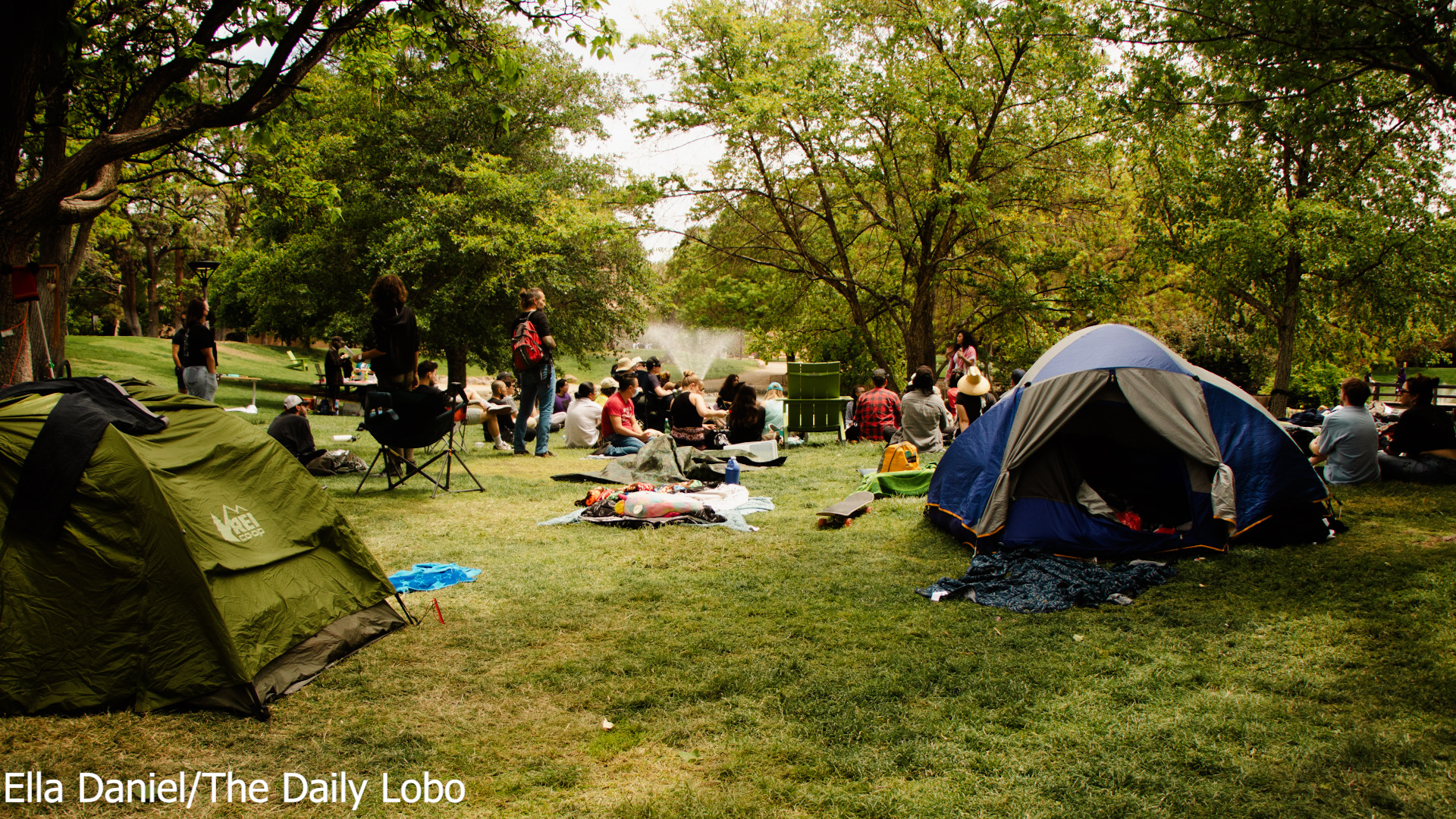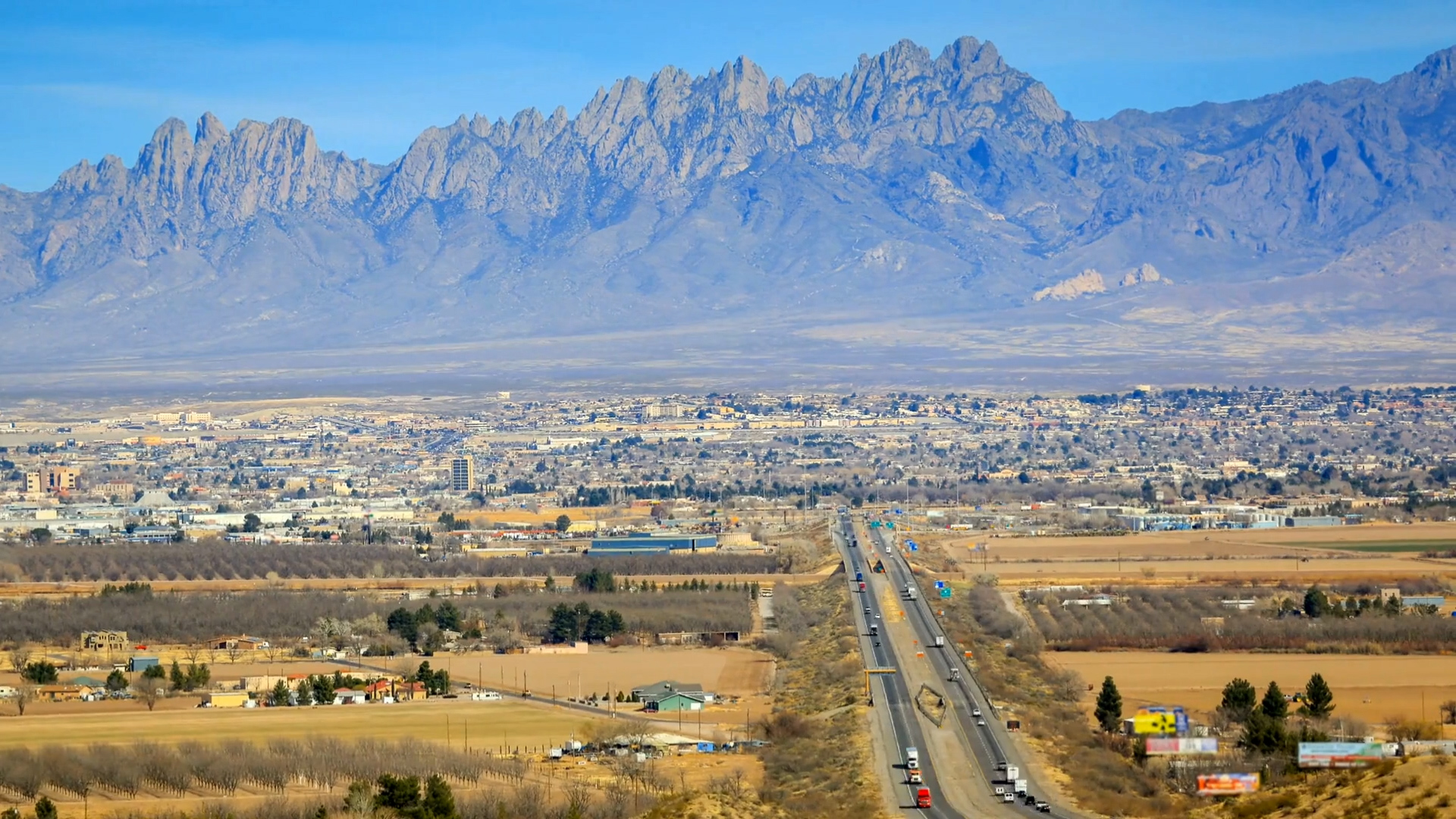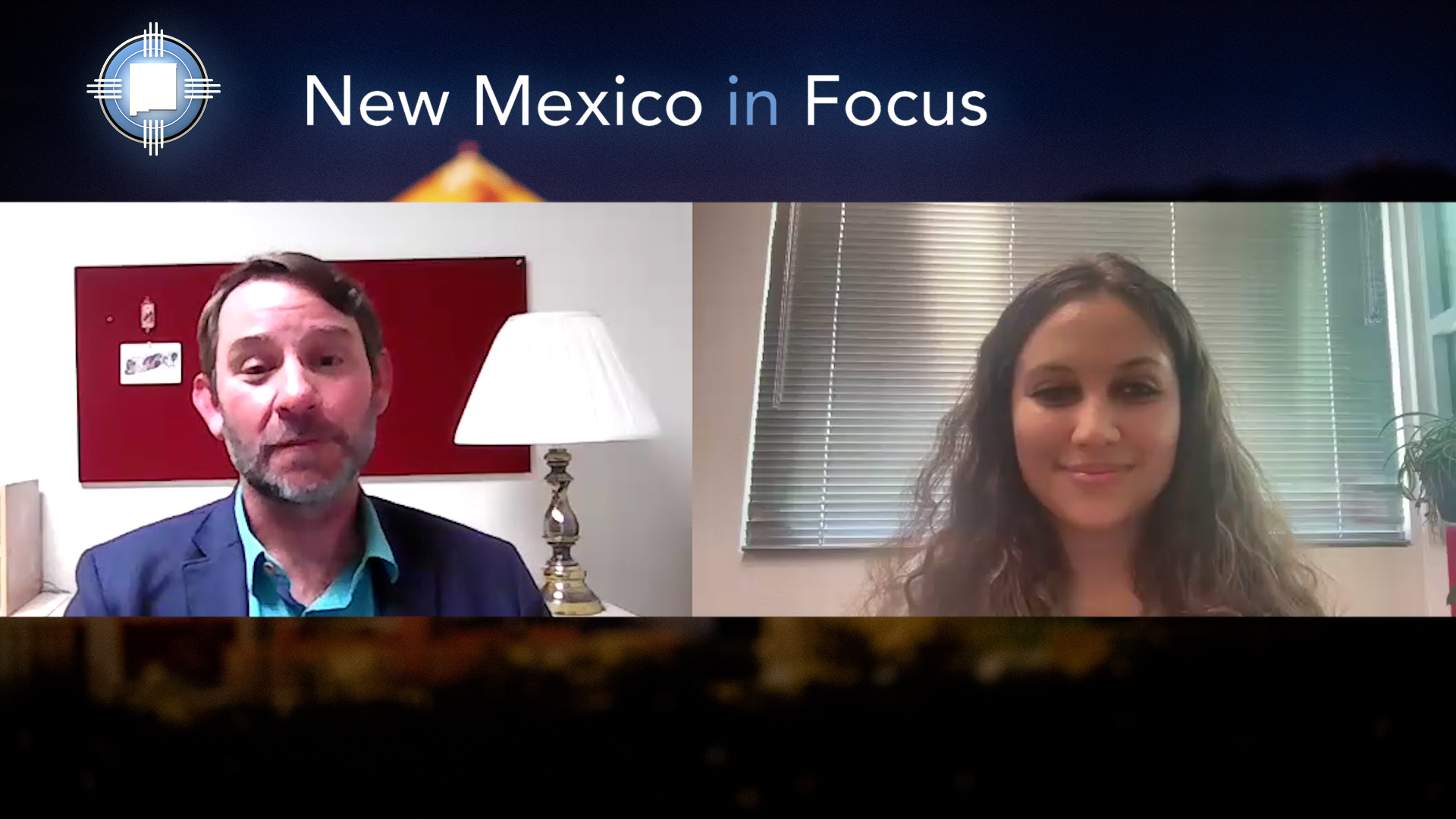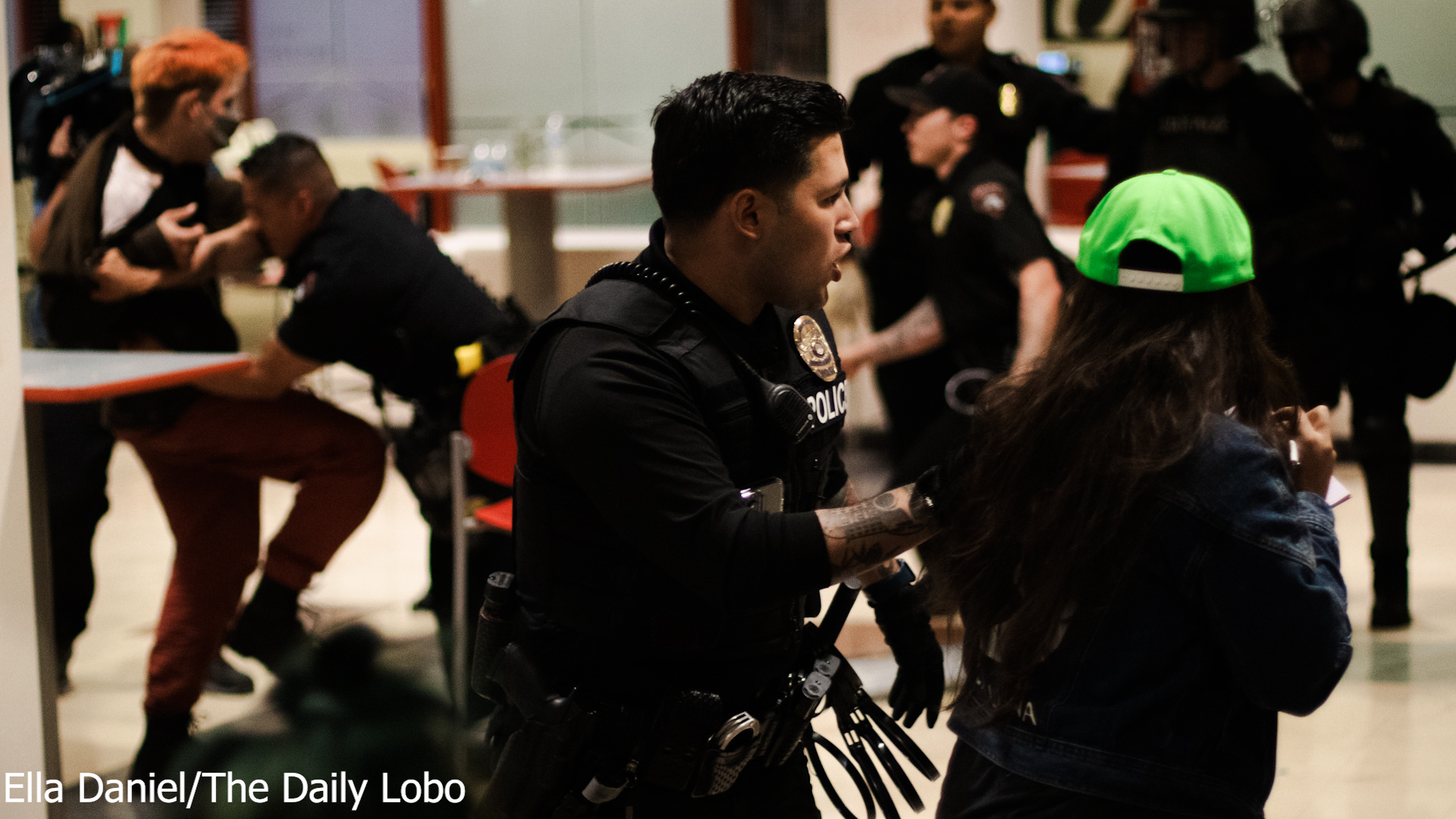Reflecting on Campus Protest Coverage as Student Journalists
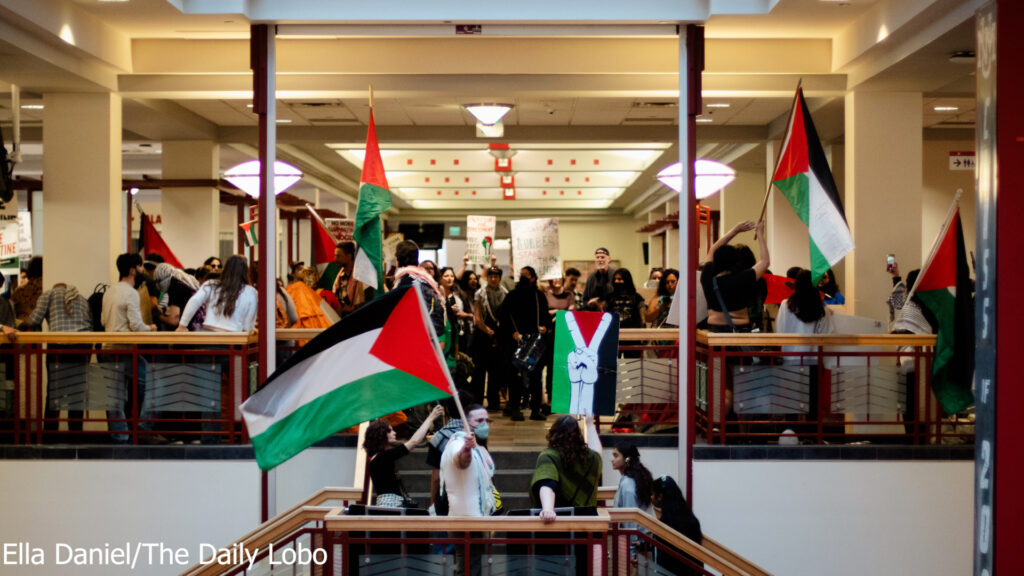
We — Paloma Chapa, Leila Chapa and Ella Daniel — began working in journalism relatively recently and have little experience in writing and photographing for news. In covering the recent pro-Palestine protests at the University of New Mexico, we worked closely together and had each other’s backs through the entire process.
Ella
As a first-year journalist covering the UNM solidarity encampment, a unique set of challenges forced me to confront the raw realities of societal unrest. I experienced an array of emotions as I strived for accuracy, balance and nuance in my journalism.
Paloma, Leila and I were at the Duck Pond encampment almost every day before the occupation of the Student Union Building. We stayed out until 1 or 2 a.m. documenting the activities of UNM police and protesters. I had no idea the protest would go on for so long.
During the night of Monday, April 29, and the early morning of Tuesday, April 30 — when protesters occupied the SUB — I found myself amidst the most intense and violent protest I’ve covered, documenting the chaos but also the underlying currents of anger, fear and frustration that fueled it. I was scared for my safety in light of several student journalists being arrested and assaulted elsewhere in the country. It was hard to judge whether I should stay at the SUB. At some point, I was even in denial that the police would show up in riot gear. I didn’t know what I was subjecting myself to.
In photographing the protest, adrenaline coursed through my body as I captured images of police pepper spraying people, throwing them to the ground, then arresting them. In these moments, instinct and survival took precedence, as I struggled to document the unfolding scene without subjecting myself to harm.
Many of the protesters I spoke to were community members driven to extraordinary measures by a feeling of injustice in a humanitarian crisis. They were mothers and fathers, students and workers, children and youth who felt UNM had betrayed them.
I did not sleep at all that night. In the week following those events at the SUB, I kept thinking about how I could have been arrested or hurt.
Leila
As a Daily Lobo videographer, I had no idea I would be standing in front of a line of riot police at 3 a.m. Just before that moment, I was doing homework in the SUB after a late dinner of Taco Bell and a Larabar. Earlier in the evening, protesters shared food, sang and chanted. As time passed, I became nervous, as the police presence increased around the SUB. I spoke with some of the student protesters who were my former classmates and others we had come to know while spending time at the encampment. We discussed our fears and feelings about the possibility of being arrested. I gave our parents’ contact information to a legal observer just in case.
By 3 a.m., I was deeply engaged in writing a paper for a class. My train of thought was suddenly interrupted by dozens of riot police running down the stairs of the SUB and filling the second floor. The cops continued to move forward, carrying batons. I imagined they would charge at any moment, but I wanted to record as much as possible before that happened. I stood directly in front of them to record video of their boots and armor. I heard my twin sister, Paloma, tell me to record, but to be mindful of their batons so I didn’t get hurt. UNM Police Department and New Mexico State Police officers charged shortly after.
I was in shock as I watched police tackle protesters to the floor and arrested them. My sister and I were forced to leave the SUB when I was recording a student getting tackled. An officer grabbed me by the backpack and said, “Out the door.” I ran to the nearest door, and he grabbed me again. I thought this was the moment I would be arrested, but then he said, “Wrong way, out the door,” and pushed me from behind. I was grateful to run to safety with Paloma, because my biggest fear was being separated from each other by cops. What if one of us got arrested and the other didn’t?
Outside the SUB, police came out and charged again. My sister and I leaped off the elevated patio onto the pavement and ran away to a safe distance. We saw Ella in the middle of all the chaos, trying courageously to get that perfect shot. At this point I was too scared to rejoin the fray and afraid of being separated from my sister. I grabbed her hand whenever I decided to run somewhere. I remember hearing protesters chanting, “We see you, we love you, we will get justice for you” at the SUB windows, watching those who sat on the floor inside with their hands zip-tied. I went up to the window and made eye contact with someone I knew. They smiled at me. This made me sad. By the end of the night, the birds were singing, and it was 5:30 a.m. We stayed up all night and we weren’t tired. When we got home, I curled up in a chair in the corner. My mom texted about how she was proud of my sister and me, because she was a journalist and did the exact same thing in the ‘80s.
Paloma
During the summer of 2020 protests, the only source I followed was the Daily Lobo. I appreciated their journalism at the time because it showed me what was really happening on the ground. While Leila and I closely read and watched the coverage, we had no aspirations or imagination that we would ever be covering a protest and encountering riot police ourselves.
Leila, Ella and I all went to the solidarity rally the first day we found out it was happening, with the intention of shooting video and taking photos. Shortly after we arrived, Ella and I got the opportunity to report on it as well, while Leila recorded video. So, we followed the story as the day progressed. I remember the moment the march ended at the Duck Pond. I saw people bringing out camping gear and starting to pitch tents. I thought of the encampments at other universities nationwide. That evening there was a police presence, but nothing like what happened a week later.
After seven days of covering the encampment, protesters moved to occupy the SUB. I was not nervous until we heard there were 29 State Police vehicles staged on campus, and protesters were filling out jail forms. Despite speaking on the phone with our editors about how it is wrong to arrest a journalist, we were still afraid, especially as UNM students in the SUB after hours — technically a violation of the student code of conduct. The only thing that kept me from being totally afraid of arrest was that there were journalists from other outlets, including Shaun Griswold of Source New Mexico, also covering the protests. I felt safe around them.
After asking protesters why they were willing to risk arrest, they all shared a common response: This issue is bigger than themselves. Some said legal or academic consequences were nothing compared to what is happening to children in Gaza.
As time passed, we waited, and sometimes doubted that police would show up. I was dozing off at my computer trying to write an essay that was due the next day, but suddenly I was wide awake at 3 a.m., when police entered the SUB in full riot gear. I immediately started recording audio, and the protesters, who had also been sleeping and doing homework, blocked doors with furniture and held makeshift shields. When the cops all charged at once, I immediately ran backwards, until I saw them tackling a student we knew from covering the encampment all week. During this moment, I did not feel any fear, because I was more shocked to see him being treated that way. I wanted it to be documented. I was shouting at Leila to record it, which she did until a cop pulled us toward the door. When we were outside, the cops continued to follow the group, using pepper spray. I could hear the cries of one person who was sprayed, which was difficult because I’d never heard anything like that before. I remember being with Leila, but we couldn’t find Ella. I was imagining that she had been trampled on her way out the door, but then I saw her taking photos in the crowd, somehow dodging the pepper spray.
Once things had calmed down, police were escorting people into their cars. Leila, Ella and I thought we could interview a State Police officer as he was taking someone out in handcuffs. We repeatedly asked if he was arresting or detaining the protesters, and he ignored us. Looking back, the three of us all agree that we were experiencing an adrenaline rush, and normally we probably wouldn’t do that.
I didn’t realize how tense I had been the whole time until I got home that morning. Leila and I were still in shock and barely spoke to each other. We didn’t talk about it much until the next day when we were working on the article and video in the newsroom with our editor, Lily Alexander.
– Ella Daniel, Paloma Chapa and Leila Chapa, Daily Lobo journalists
-
Why Pro-Palestinian Protests Resonate with Young People
5.10.24 – In the second half of our roundtable discussion on the pro-Palestine protests at UNM and across the country, the…
-
Community Organizing in Southern New Mexico
5.10.24 – In the first of a two-part interview with Executive Producer Jeff Proctor, Sarah Silva tells us about her work…
-
Jewish Voice for Peace Stands with Students
5.10.24 – Executive Producer Jeff Proctor speaks with Sophie Leah of Jewish Voice for Peace and asks why her organization wants…
-
Pro-Palestine Protest Encampments at UNM
5.10.24 – Source New Mexico Editor Shaun Griswold hosts a two-part roundtable discussion on the pro-Palestine protests taking place at the…


